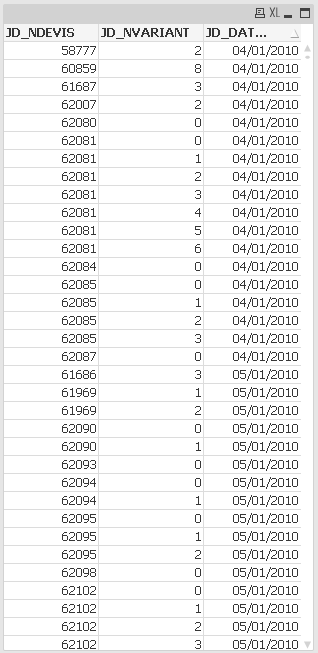Unlock a world of possibilities! Login now and discover the exclusive benefits awaiting you.
- Qlik Community
- :
- All Forums
- :
- QlikView App Dev
- :
- Max of concatenation
- Subscribe to RSS Feed
- Mark Topic as New
- Mark Topic as Read
- Float this Topic for Current User
- Bookmark
- Subscribe
- Mute
- Printer Friendly Page
- Mark as New
- Bookmark
- Subscribe
- Mute
- Subscribe to RSS Feed
- Permalink
- Report Inappropriate Content
Max of concatenation
Hello,
For an analysis I need to retrieve the max date of some datas. Let me explain:
The company is issuing differen quotes for the same order number. Therefore they asked me to retrieve some statistics starting from august 01, 2014. The problem is that some quotes for an order have been issued after that date and before that date. Until now, my script was retrieving only the quotes that were issued after 01/08/2014, but the quotes issued before are forgotten but very important for my statistics.
After loading the datas for the quotes and orders, I tried to load the quotes on another way, like this:
Load JD_NVARIANT,
max(concat(JD_DATE)) as JD_DATE_MAX
resident Table_suivi_devis
group by JD_NVDEVIS;
where JD_NVARIANT is the quote number, JD_DATE, the date of the quote and JD_NDEVIS, the order number. When relaoding, an error appear: Nested aggregation not allowed
How could I solve this problem? Thank you ![]()
- Tags:
- new_to_qlikview
- « Previous Replies
-
- 1
- 2
- Next Replies »
Accepted Solutions
- Mark as New
- Bookmark
- Subscribe
- Mute
- Subscribe to RSS Feed
- Permalink
- Report Inappropriate Content
Well actually in my table statistics it is working good.
Here is the script used:
Load JD_NDEVIS,
if(max(date(JD_DATE))>='01/08/2014',1,0) as DATE_OK,
max(date(JD_DATE)) as JD_DATE_OK
resident Table_suivi_devis
group by JD_NDEVIS;
and in the dimension expression of JD_NDEVIS, I used this:
=if(DATE_OK=(1), JD_NDEVIS)
- Mark as New
- Bookmark
- Subscribe
- Mute
- Subscribe to RSS Feed
- Permalink
- Report Inappropriate Content
Hi Vincent,
You need to group by all fields that aren't agregated, so JD_NVARIANT has to be part of the 'group by':
Load JD_NVARIANT,
max(concat(JD_DATE)) as JD_DATE_MAX
resident Table_suivi_devis
group by JD_NVARIANT, JD_NVDEVIS;
Also, I don't understand the "max(concat(JD_DATE))"?
Probably should be only max(JD_DATE)
- Mark as New
- Bookmark
- Subscribe
- Mute
- Subscribe to RSS Feed
- Permalink
- Report Inappropriate Content
I tried this:
Load JD_NVARIANT,
max(concat(JD_DATE)) as JD_DATE_MAX
resident Table_suivi_devis
group by JD_NVARIANT, JD_NVDEVIS;
and this:
Load JD_NVARIANT, JD_NDEVIS,
max(concat(JD_DATE)) as JD_DATE_MAX
resident Table_suivi_devis
group by JD_NVARIANT, JD_NVDEVIS;
But it still tells me the same error 😕
- Mark as New
- Bookmark
- Subscribe
- Mute
- Subscribe to RSS Feed
- Permalink
- Report Inappropriate Content
Should be the max(concat(JD_DATE)), try only max(JD_DATE)
- Mark as New
- Bookmark
- Subscribe
- Mute
- Subscribe to RSS Feed
- Permalink
- Report Inappropriate Content
There is no error with this, but it doesn't filter the data correctly 😕
In the beginning, I tried something like this, because it is what it should look like:
Load JD_NVARIANT,
if(max(concat(JD_DATE)) >= '01/08/2014', JD_DATE_OK)
resident Table_suivi_devis
group by JD_NVARIANT, JD_NVDEVIS;
but I knew it would be working since the true value is not good. Do you think of qnother way of doing so?
- Mark as New
- Bookmark
- Subscribe
- Mute
- Subscribe to RSS Feed
- Permalink
- Report Inappropriate Content
concat makes a concatenation of strings, so if one date is '01/08/2014' and another '02/08/2014' it will return '01/08/201402/08/2014'
Can you try?:
if(max(Date(JD_DATE))>= '01/08/2014', JD_DATE_OK)
If you can upload a sample and what you're expecting I can give you a better help.
- Mark as New
- Bookmark
- Subscribe
- Mute
- Subscribe to RSS Feed
- Permalink
- Report Inappropriate Content
Since my field JD_DATE_OK doesn't exist yet, I transformed a little bit your expression:
if(max(JD_DATE)>= '01/08/2014', JD_DATE) as JD_DATE_OK
but there is an error 😕
I aslo tried something like that:
if(max(JD_DATE)>= '01/08/2014', 1, 0) as DATE_OK
so when I filter my data it only show the order numbers that have a quote issued after the date 01/08/2014 but I still have some orders not corresponding to the condition.
- Mark as New
- Bookmark
- Subscribe
- Mute
- Subscribe to RSS Feed
- Permalink
- Report Inappropriate Content
But all the quote dates are >='01/08/2014'?
When you create a field like:
max(JD_DATE) as MAX_JD_DATE
What values are stored in MAX_JD_DATE?
- Mark as New
- Bookmark
- Subscribe
- Mute
- Subscribe to RSS Feed
- Permalink
- Report Inappropriate Content
In order to show the order, only one quote has to have a date as >='01/08/2014'. If this requirement is met, all the quotes (even the one with a date <'01/08/2014') can be retrieved.
I cretaed a field like max(JD_DATE) as MAX_JD_DATE and it looks like this:
- Mark as New
- Bookmark
- Subscribe
- Mute
- Subscribe to RSS Feed
- Permalink
- Report Inappropriate Content
Well actually in my table statistics it is working good.
Here is the script used:
Load JD_NDEVIS,
if(max(date(JD_DATE))>='01/08/2014',1,0) as DATE_OK,
max(date(JD_DATE)) as JD_DATE_OK
resident Table_suivi_devis
group by JD_NDEVIS;
and in the dimension expression of JD_NDEVIS, I used this:
=if(DATE_OK=(1), JD_NDEVIS)
- « Previous Replies
-
- 1
- 2
- Next Replies »